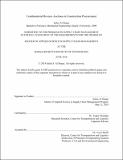Combinatorial Reverse Auctions in Construction Procurement
Author(s)
Al Shaqsi, Salim
DownloadAl-Shaqsi_2018_Capstone.pdf (1.104Mb)
Metadata
Show full item recordAbstract
Construction procurement often involves negotiations between many parties over multitudes of components. The process of allocating contracts to suppliers is generally a complex process involving multiple decision makers processing large amounts of information. Minimizing project costs while meeting stringent specification and schedule requirements is especially difficult. In most cases, procurement processes do not consider combinatorial (or package) bids from suppliers. Allowing combinatorial bidding in the procurement process has been shown to reduce costs in other industries. It can, therefore, be expected to reduce costs in construction. This research proposes the use of combinatorial reverse auctions to minimize construction costs. Various models were applied to real data to determine feasibility compared to the baseline of allocating all items to the lowest bidder. Data included seven scenarios selected based on the number of suppliers and number of items. Each scenario included a subset of bids submitted by approved suppliers. A sensitivity analysis was performed on each model-scenario pair to consider uncertainty in supplier pricing structures. Results of the analysis provided justification for the use of combinatorial reverse auctions in construction procurements. Cumulative cost savings across all seven scenarios were 6.4% for unconstrained models and 2.7% for constrained models with limits on the number of awarded suppliers. Further analysis on the computation time and distribution of solutions across various methods indicated the superiority of the iterative approach to solving the winner determination problem in terms speed and optimality. However, stochastic and meta-heuristic approaches using a genetic algorithm led to higher variations in allocations while maintaining low variations in total cost. This suggests that they can be used to provide families of near-optimal solutions.